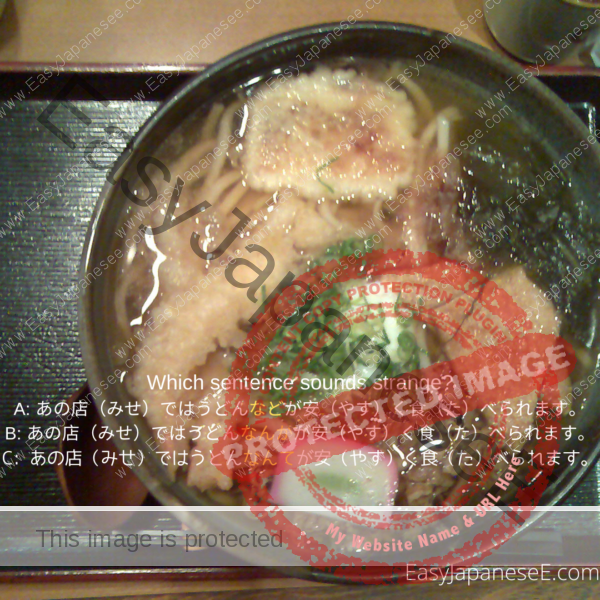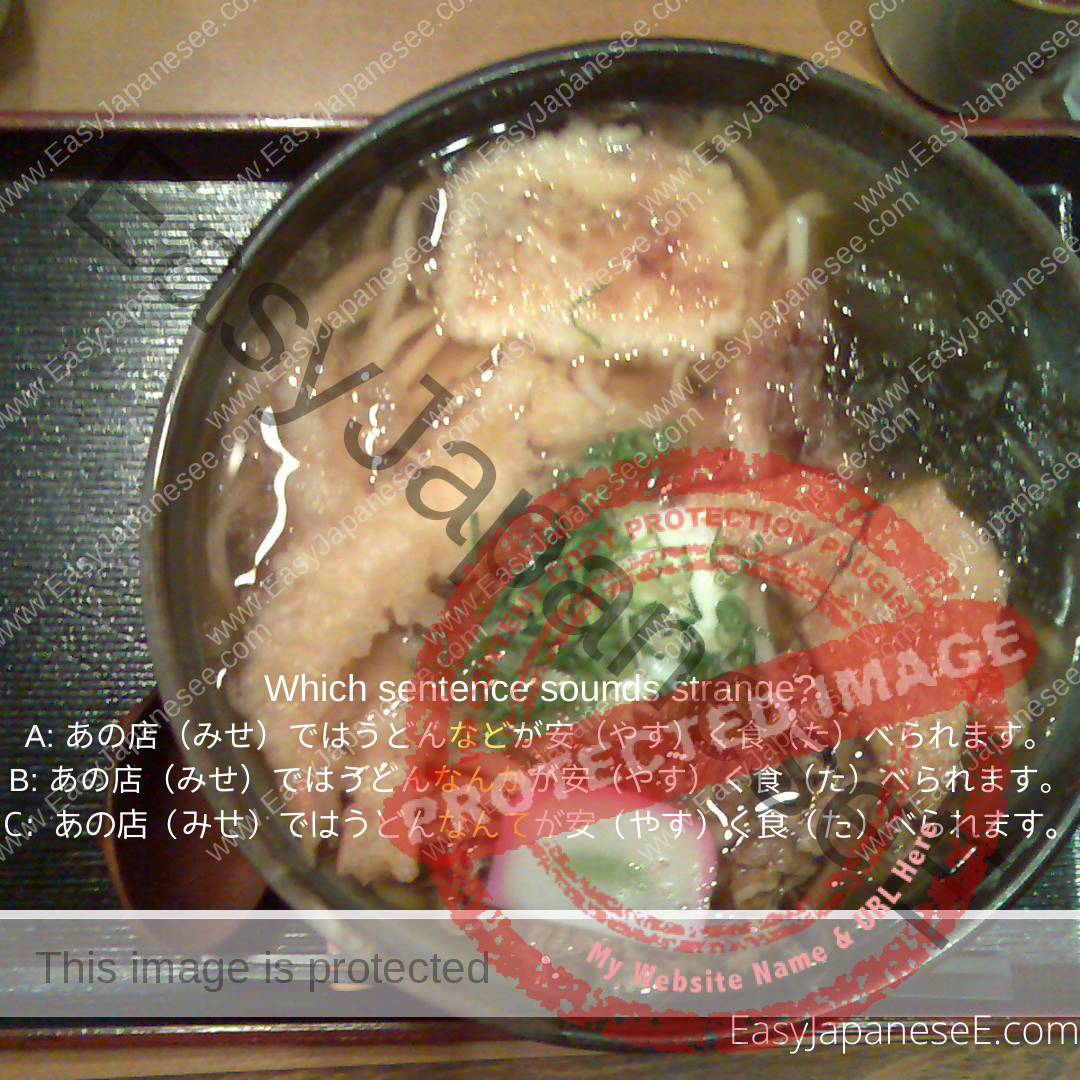
Today’s Grammar Point: ~など/~なんか/~なんて
~など、~なんか、~なんて all mean something like “such as ~,” “something like ~,” etc.
I think usages of ~など, ~なんか and ~なんて can be divided into the following three and depending on the other words in the sentence not all three expressions can be used:
- to list up the same kind: etc., and so on, and the like.
- to soften the definitive tone
- as a humble/derogatory expression
~なんか can be considered a casual version of ~など, so ~なんか and ~など are almost interchangeable but while ~など can be used after a verb, ~なんか usually follows a noun only (apart from ~たり form) and ~なんか has a stronger feel of “belittling” of the preceding noun than ~など, so there are occasions it’s better not to swap ~など with ~なんか.
When ~なんて is used for the meaning of “such as ~”or “~ and alike,” that includes the meaning of the particles と and/or は, so ~などと, ~などという or ~などは can be replaced with ~なんて but what can follow ~なんて is limited. For instance, no particle will be used after ~なんて and です/だ cannot be used directly after ~なんて.
~なんて is also often used to imply the speaker’s feeling of “unexpectedness.” This ~なんて is not usually replaced with ~など or ~なんか.
In the examples below, △ means it is grammatically acceptable but sounds a little awkward.
Connections
- [noun] + など/なんか/なんて
- [plain verb] + など/なんて
- [plain verb] こと + なんか
- [たform verb] + り + など/なんか/なんて
- [いadj stem] く など/なんか/なんて ない
to list up the same kind: etc., and so on, and the like
With this meaning ~など often accompanies や or ~たり. As ~など in this meaning is very formal, replacing with ~なんて may sound a bit awkward.
You can eat udon and alike cheaply at that shop.
(✓)あの店ではうどんなどが安く食べられます。
(✓)あの店ではうどんなんかが安く食べられます。
(✖)あの店ではうどんなんてが安く食べられます。At that supermarket, liquor such as beer and wine is cheap.
(✓)あのスーパーは、ビールやワインなどのお酒が安いです。
(△)あのスーパーは、ビールやワインなんかのお酒が安いです。
(✖)あのスーパーは、ビールやワインなんてお酒が安いです。It is forbidden here to do things like to speak loudly and/or to drink alcohol.
(✓)ここでは大声で話したり、お酒を飲んだりなどの行為は禁止されています。
(△)ここでは大声で話したり、お酒を飲んだりなんかの行為は禁止されています。
(✓)ここでは大声で話したり、お酒を飲んだりなんて行為は禁止されています。(Note this なんて is for などという, thus the particle の is no longer used.)
to soften the affirmative tone
I read books at home on Sundays and alike.
(✓)日曜日などは家で本を読みます。
(✓)日曜日なんかは家で本を読みます。
(✓)日曜日なんて家で本を読みます。I practice soccer on Sundays and alike.
(✓)サッカーは日曜日などに練習します。
(✓)サッカーは日曜日なんかに練習します。
(✖)サッカーは日曜日なんてに練習します。(No particle after ~なんて as ~なんて includes the particles と and/or は. Even if you take に out, it still sounds strange in this context.)What’s wrong? You’ve burst into tears suddenly.
(✓)どうしたの?急に泣き出したりなどして。
(✓)どうしたの?急に泣き出したりなんかして。
(✖)どうしたの?急に泣き出したりなんてして。(As ~なんて includes the meaning of the particles と and/or は, して cannot follow ~なんて.)
as a humble/derogatory expression
Are you sure someone like me is OK?
(✓)私などでよろしいですか。
(✓)私なんかでよろしいですか。
(✖)私なんてでよろしいですか。I can’t marry my precious daughter to that man.
(✓)あの男などに大事な娘を嫁にやるわけにはいかない。
(✓)あの男なんかに大事な娘を嫁にやるわけにはいかない。
(✖)あの男なんてに大事な娘を嫁にやるわけにはいかない。I’ll beat that guy.
(✓)あんなやつなど(は)やっつけてやる。
(✓)あんなやつなんかやっつけてやる。
(✓)あんなやつなんてやっつけてやる。
To emphasise “negation”
I can’t do the work of a teacher and alike.
(✓)教師の仕事など(は)やっていられない。
(✓)教師の仕事なんかやっていられない。
(✓)教師の仕事なんてやっていられない。You can’t do such a thing as throwing this book away.
(✓)この本を捨てるなど(は)私にはできない。
(✓)この本を捨てることなんか私にはできない。As ~なんか cannot follow a verb directly, こと is added to make the verb 捨てる into a noun.
(✓)この本を捨てるなんて私にはできない。It’s not at all painful.
(✓)痛くなどない。
(✓)痛くなんかない。
(✓)痛くなんてない。
The answer to today’s question: C
As ~なんて includes the meaning of the particle は in this case, if you skip この店では and が, うどんなんか安く食べられます alone is OK (it means “we can eat udon noodles and alike cheaply”) but you cannot use なんて otherwise.
~なんて for “unexpectedness”
~なんて can be used to imply the speaker wasn’t expecting what precedes なんて. This ~なんて cannot usually be replaced with ~など or ~なんか.
別れるなんて嘘でしょ?
You don’t really mean you want to break up, do you?あんなに勉強したのに不合格なんて、信じられない。
I can’t believe I failed even though I studied so much.
なんか and なんて as they are
So far, I talked about ~など, ~なんか, ~なんて, which always follow another word. There is no independent usage of など but なんか and なんて can be used independently.
なんか is a casual form of なにか and means “somehow,” “in some way,””something,” or “somehow,” etc.
なんかやさしい人。
(He’s) a somewhat kind person.ごめん、今なんか言った?
I’m sorry, did you say something now?
なんて is a casual version of なんという (What! for exclamation) or なんと (“what?” to ask for what has been said).
なんてやさしい人!
What a kind person!ごめん、今なんて言った?
I’m sorry, what did you say now?
If you liked this article, please share it with your friends using the social media buttons below. Also, your clicks on ads on this page help covering the cost of running this website. Your support will be much appreciated.


One Reply to “~など/~なんか/~なんて”